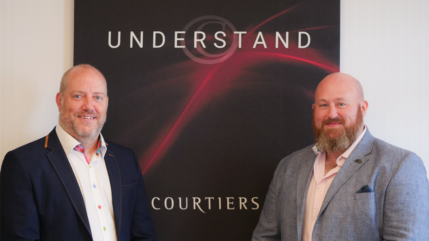Rising house prices combined with a freeze on IHT allowances until at least April 2028 means the government is on course to rake in £7.2bn this financial year from Inheritance Tax alone. No wonder in a survey it topped Britain’s taxes list as the ‘most despised’.
With more people paying more in IHT than ever before, it’s no surprise that IHT’s a subject which often comes up in discussions between Courtiers clients and their Advisers.
The article is not a substitute for financial advice, rather it outlines various ways to mitigate IHT, which may be relevant to you or your family’s situation and which could help you meet your future financial goals and objectives. If any strike a chord as being potentially beneficial, or for an insight into current Inheritance Tax rules and legislation, please speak to your Courtiers Adviser.

Spend more
The general rule on mitigating IHT is that the more you reduce the estate on which IHT is calculated, the lower your IHT bill will be.
The first strategy to stop your estate getting bigger or even to reduce it is to spend more. In our experience this is not as easy as it seems. As wealth Advisers, we are often able to point out to clients that they can afford to spend a bit more on themselves, for example by treating themselves to a special holiday, while still having enough money to meet their own needs.
In some instances, we can demonstrate that funding spending by selling investments to pay for school fees, for example, can be a sensible option, as even if Capital Gains Tax is due, the tax bill is generally lower. Cashflow modelling allows us to explore how different spending levels and patterns can affect clients’ ability to meet their financial goals and objectives.

Make a will
Making a will is one of the most important ways to pay less IHT. It also avoids potentially difficult situations following a death. For these two reasons, we strongly advise our clients to make one if they haven’t already done so.
You can use your will to set up trusts and to make gifts that use up your IHT allowance. Deeds of variation allow you to alter the intended beneficiary, for example, allowing you to pass the assets to your grandchildren held in trust until they are 18. A will can also take advantage of the spousal exemption, which allows a spouse or civil partner to inherit assets tax-free. If you don’t make a will, the rules of intestacy apply, which are very unlikely to be IHT tax efficient.

Gifting
Gifting during your lifetime can be an effective way to reduce the value of your estate for IHT purposes. While many clients naturally would like to gift as much as possible to their family and loved ones, our advice is always tempered by the need to ensure that the client has enough to meet their own needs.
There are several types of gifting, each with their own rules.
You can give away a total of £3,000 worth of gifts each tax year without them being added to the value of your estate. This is known as your annual exemption.
Potentially exempt transfers (PETs) are direct gifts made above an individual’s annual exemption. You can make unlimited tax-free gifts in this way, although they are subject to the ‘seven-year rule’. This means that should you die within seven years of making the gift, some or all of the gift will fall back within your estate.
A type of gift that is not deemed a PET is a Chargeable Lifetime Transfer (CLT). Typically, CLTs involve gifts made to discretionary trusts, and they are relatively complex by nature. If you would like further information, please contact your Courtiers Adviser.
Then there’s gifting out of income. You can make a gift out of your surplus income without any IHT charge.

Setting up a trust
One of the reasons Courtiers clients set up trusts is because as separate legal entities, they no longer constitute part of their estate for IHT. As with a Potentially Exempt Transfer, this depends on the person who puts the asset into a trust (the settlor) surviving for seven years.
There are several different types of trusts, each offering the settlor varying degrees of control over how the trust assets are used and who benefits. While trusts can be an effective way of mitigating IHT, it’s important to be aware that they can be complex and come with their own costs, additional responsibilities, and potential tax charges. For these reasons, before setting up a trust, it’s wise to discuss the available options and any implications with your Courtiers Adviser.

Leave money to charity
Gifts to charities are exempt from IHT, irrespective of whether they are made during a person’s lifetime or on death through a will.
However, since 2012 as a way of encouraging charitable giving, people who leave 10 per cent or more of their net estate (after deducting IHT exemptions, reliefs and the nil-rate band) to charity are taxed at a lower rate of 36 per cent compared to the usual 40 per cent. This is a win-win when both clients and their chosen charities benefit.

Insurance
Setting up a whole of life insurance plan where the policy is written in trust can be a useful way of ensuring that any IHT liability is paid and doesn’t fall on your relatives, giving you and them peace of mind. The downside is the cost of cover, which tends to rise the older you get so you’ll need to budget for it carefully.
With this and all types of gifting, we advise clients keep a record, to make it easier for the executor of your will to manage, while keeping HMRC happy if they present any queries.
Summing up
The six strategies outlined above are proven ways for Courtiers clients to mitigate IHT and this article is only a starting point. Should you wish to find out more about these and other ways to mitigate IHT as the tax continue to bite, please get in touch with your Courtiers Adviser or contact us.













